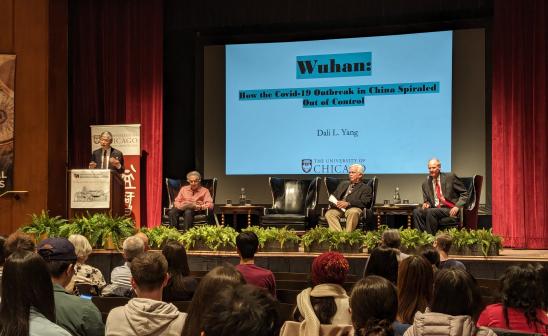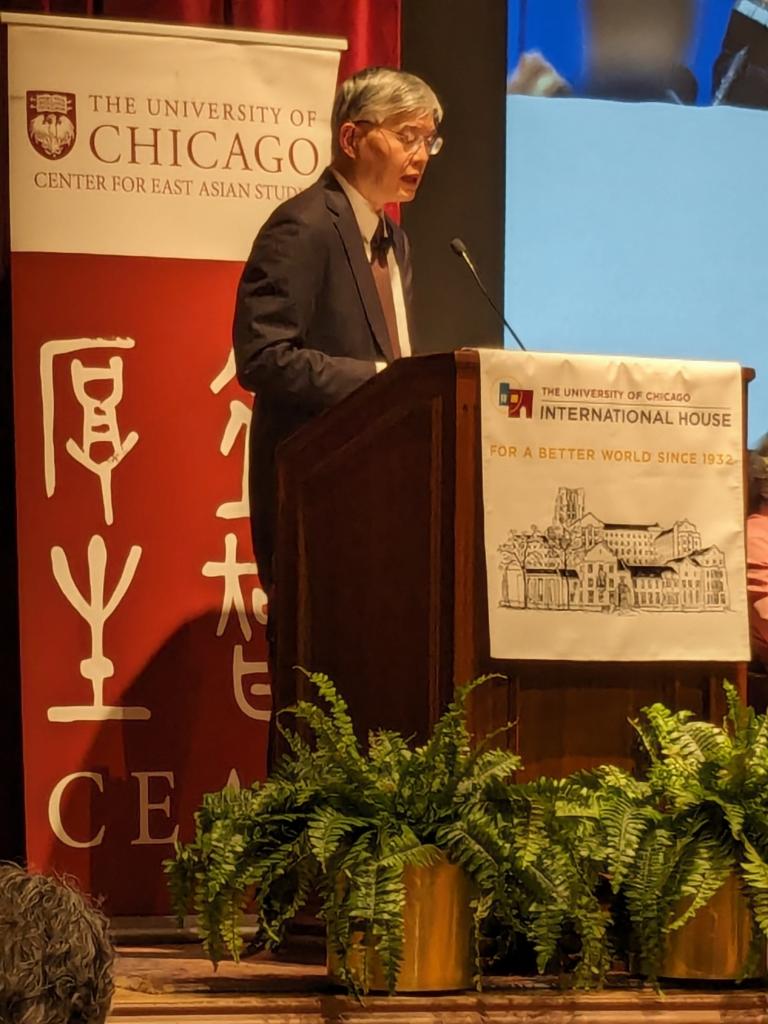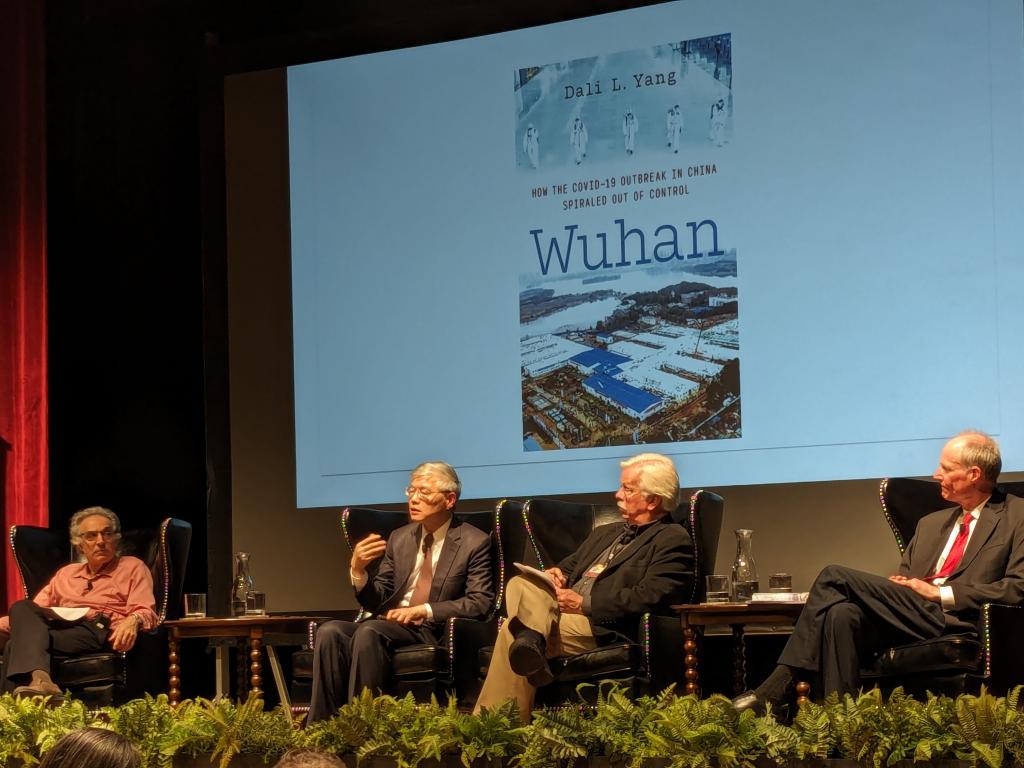A Panel of Scholars Discuss Dali Yang's Recent Publication on the COVID-19 Outbreak in China

On May 25th, the Center for East Asian Studies hosted Dali Yang, William C. Reavis Professor of Political Science, a proliferate scholar on politics and political economy of China, to discuss his recently published book, Wuhan: How the COVID-19 Outbreak in China Spiraled Out of Control (Oxford University Press 2024). The conversation was moderated by Kenneth Pomeranz (University Professor of Modern Chinese History) and joined by Professor John Mark Hansen (Charles L. Hutchinson Distinguished Service Professor, Department of Political Science), Yang’s long-time colleague who specializes in U.S. politics, and Dr. Renslow Sherer (Department of Medicine–Infectious Diseases and Global Health) whose research focuses on global pandemic and human rights and has concentrated on areas including China in the past. The book, in Professor Yang’s own words, is about “an experience we all share, cope, and struggle against in our ways.” Not only is the book an impressive “reconstruction of the event” “scene-by-scene” according to Professor Hansen, but most importantly, it asks a bigger question of how the challenges of public health and political bureaucracy of one country can shed light on a global view of COVID.

Wuhan: How the COVID-19 Outbreak in China Spiraled Out of Control attempts to retroactively construct the beginning moment of the “generation-defining experience” of COVID in Wuhan through information on social media, provincial, as well as central public health bureaucracies. Professor Yang highlighted the governmental authorities’ ambivalent attitude toward the recognition of the “gravity of the situation. ” He juxtaposed a nation-wide pandemic preparedness exercise which was organized prior to the COVID outbreak, hospitals and renowned doctors’ whistle-blowing, the China CDC leadership’s overconfidence, along with other material evidence. He contrasted the action program that was adopted on January 1, 2020 with the subsequent delay in recognizing that the virus had spread. Hence Professor Yang raised the central question his book seeks to address: what happened behind the scenes in the period before and after the official recognition of the nature of the virus on January 20th? What are the factors and stakeholders that caused delays in the government’s expected swift reaction? In broader terms, what characterizes the decision-making process of political institutions during emergencies?

Professor Pomeranz commented that the question is one "about decision-making" of the system as the protagonist, showcasing the complexity of the coexistence of both effective and flawed actions. He emphasized that the book focused on an event that had a precise historical, spatial, and political location, and a tight causal sequence. By raising questions about how the situation would develop differently given a different time or city in China, Professor Pomeranz suggested that "maybe not much" would change and pointed out the importance of understanding the intrinsic logic of the system: on the one hand, it could organize effective mobilization, but on the other it prioritized the potential threat of destabilizing rumors over disseminating all evidence which indicated a need for rapid action, setting the path for tragedy. Additionally, he finds the exploration of accountability and the aftermath of governmental actions during the crisis to be profoundly disturbing, highlighting a key aspect of the book's analysis.
As an expert who has been working in the global health of HIV/AIDS, Dr. Renslow Sherer provided a different lens of understanding the book. He emphasized the book’s unique contribution to the global understanding of COVID-19, stressing the need for and importance of similar ex post facto analyses for all countries, which can serve as a referential blueprint for understanding how each political system will react when facing new medical emergencies. He described the Chinese government’s emergent reaction to the pandemic rather favorably with those of the United States yet remained critical of the forcefulness of the Chinese political system in the case of the censored whistle-blower Li Wenliang. He noted the fragmentary aspects of authoritarianism, which can reveal unexpected gaps and weaknesses.
In his closing remarks, Professor Hansen delve into various aspects of political responses during emergencies. Professor Hansen raised the question of whether such responses are inevitable in any political system given the costly and high-pressure nature of governmental decision-making and the goal to convey with great credibility by being extra careful in information and acknowledging the substantial uncertainty inherent in crises. Facing the question of how much of the situation can be attributed to the Chinese government and how much to bureaucratic politics in general, Professor Hansen suggested that a more pertinent comparison than China versus a hypothetical situation is whether the United States would perform better in similar circumstances, which is of greater practical concern.

Professor Yang responded to the questions. Among other things, he noted that China is the site of two novel coronavirus outbreaks in seventeen years. After the discussion among all interlocutors, they answered questions from the audience. Both the talk and audience’s reaction drew attention to the complex interplay between political dynamics and policy implementation in pandemic emergencies.
This event was a part of the East Asia by the Book! CEAS Author Talks series, an initiative in partnership with the Seminary Co-op Bookstores, and co-sponsored with the International House Global Voices Program, the Department of Political Science and PhD in Political Economy, the Center for Global Health, and the Forum for Free Inquiry and Expression at the University of Chicago.
Written by Xueqi Sun
 THE UNIVERSITY OF CHICAGO
THE UNIVERSITY OF CHICAGO

